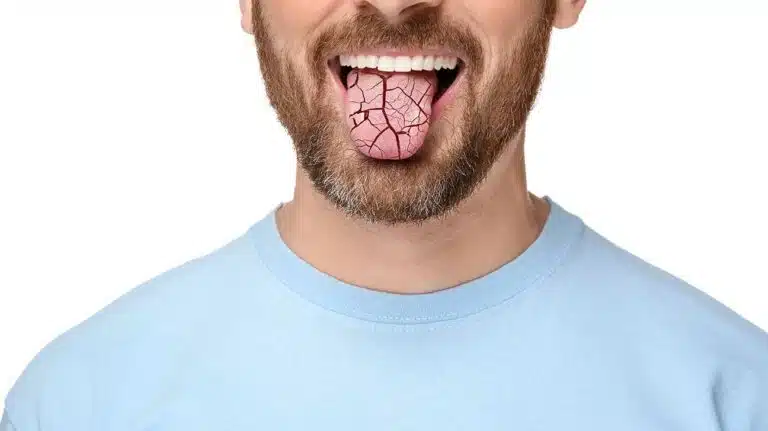Adderall Tongue | Symptoms, Causes, & How To Get Rid Of It

According to government data, around 10% of school aged children are diagnosed with ADHD (attention-deficit hyperactivity disorder) at some point, with the disorder persisting in around 4.4% of adults.
Fortunately, for all its serious and long-lasting negative effects, ADHD can often be managed using a slate of prescription stimulant medications like Ritalin and Concerta (methylphenidate), Dexedrine (dextroamphetamine), Vyvanse (lisdexamfetamine), and Adderall (mixed amphetamines).
However, Adderall and similar medications all have common side effects that can impact those who use them, including an informal condition known as Adderall tongue.
What Is Adderall Tongue?
When someone talks about having Adderall tongue or Adderall mouth, it probably means they’re dealing with a combination of different oral symptoms stemming from Adderall’s known side effects.
Symptoms Of Adderall Tongue
Contributing symptoms of Adderall tongue can include:
- mouth and tongue dryness/cottonmouth (xerostomia)
- persistent cheek, lip, or tongue sucking, chewing, or biting
- general soreness of the tongue and mouth
- swelling of the tongue, cheek, or lips
- tongue discoloration
- heightened thirst
- sticky saliva
- a burnt feeling or bitter taste in the mouth
- tongue and mouth sores, bumps, or ulcers
- teeth clenching (bruxism)
- bad breath
Note that Adderall tongue can develop through the use of any amphetamine-type stimulant drug, not just Adderall or other ADHD medications, and that the symptoms a person experiences will vary from individual to individual.
In fact, the experience of Adderall tongue can range from a manageable inconvenience to a condition severe enough to cause serious pain, injury, and permanent scarring.
What Causes Adderall Tongue?
Adderall is made with a combination of amphetamine and dextroamphetamine. This makes Adderall a potent central nervous system stimulant closely related to methamphetamine, with similar effects on the central nervous system and a similar potential for abuse.
When you take Adderall, amphetamines are absorbed in your digestive tract and transported through the bloodstream to the central nervous system, and the brain in particular.
The medication then blocks the reuptake of certain neurotransmitters, specifically dopamine, norepinephrine, and serotonin, greatly increasing their overall effects on the body in turn.
While boosting dopamine activity can be helpful for someone with ADHD, it can also impact other bodily systems. This includes a person’s motor control (leading to unintentional fidgeting or tics), hydration level, vasoconstriction, and saliva production (which, if interrupted, can contribute to bacterial growth in the mouth).
How Common Is Adderall Tongue?
While the exact risk is unclear, the likelihood that a particular person who takes Adderall will experience severe Adderall tongue is low.
Dry mouth, as a side effect of Adderall, is known to impact as much as 35% of those who take the medication, usually only to a mild or moderate degree. Moreover, Adderall’s side effects are known to improve as a person’s body adapts and adjusts to the medication’s effects.
In one four-week, placebo-controlled study of adults with ADHD, 23 out of 191 participants discontinued Adderall XR due to its side effects, with only three (1.3%) citing dry mouth as the deciding factor.
However, given that Adderall’s side-effects tend to be dose-dependent, those who take higher doses or abuse Adderall chronically may be at a much higher risk.
How To Get Rid Of Adderall Tongue
ADHD treatment is often a balancing act and making adjustments to limit side effects and improve one’s personal comfort. This may mean lowering your dosage or switching to another medication, including some non-stimulant treatment options.
Otherwise, dry mouth and the other side effects that contribute to Adderall tongue can sometimes be managed by:
- drinking more water, especially during meals
- avoiding caffeine, alcohol, and tobacco
- limiting spicy or salty foods
- using sugar-free gum or lozenges
- using a humidifier at night
- using dry mouth mouthwashes
- using over-the-counter artificial saliva products (sprays, lozenges, gels)
- getting more sleep
- improving your overall diet and nutrition
Treating Adderall Addiction
In contrast, if you’ve been dealing with Adderall tongue after abusing Adderall or a similar prescription drug, addiction treatment may be recommended.
At Ark Behavioral Health, our professional teams treat stimulant abuse, dependence, and addiction through evidence-based services, including:
- medical detoxification
- mental health counseling
- behavioral therapy (group and individual)
- dual diagnosis treatment
- other alternative treatment options
To learn more, please contact us today.
Written by Ark Behavioral Health Editorial Team
©2024 Ark National Holdings, LLC. | All Rights Reserved.
This page does not provide medical advice.
American College of Prosthodontists - Stimulants of Abuse and Oral Health
Centers for Disease Control and Prevention (CDC) - Data and Statistics About ADHD
Food and Drug Administration (FDA) - ADDERALL XR HIGHLIGHTS OF PRESCRIBING INFORMATION
Mayo Clinic - Dry mouth - Diagnosis and treatment
Questions About Treatment?
Ark Behavioral Health offers 100% confidential substance abuse assessment and treatment placement tailored to your individual needs. Achieve long-term recovery.
100% confidential. We respect your privacy.
Prefer Texting?
Our friendly support team is here to chat 24/7. Opt out any time.







 Learn More
Learn More








